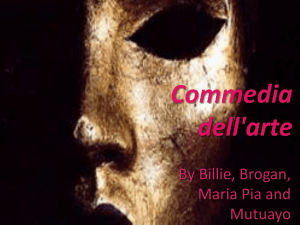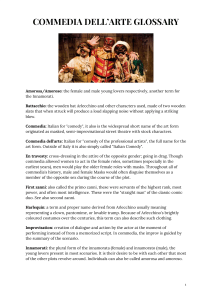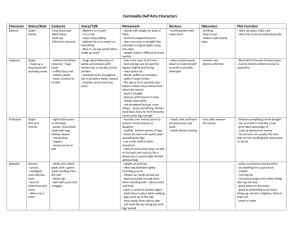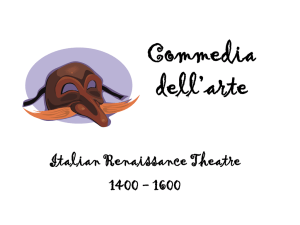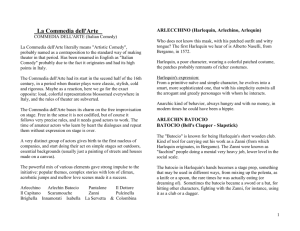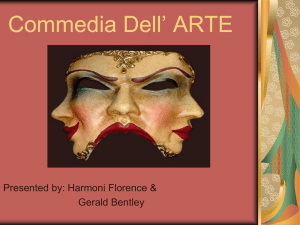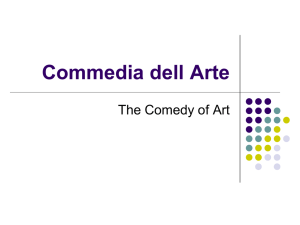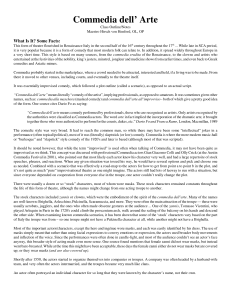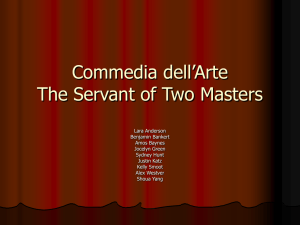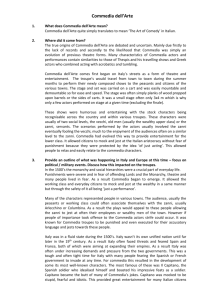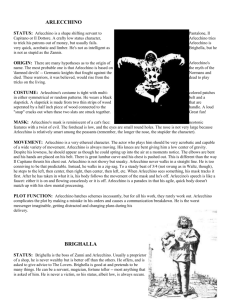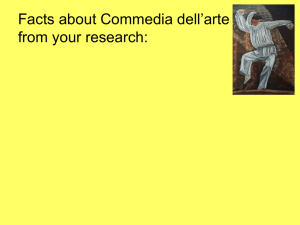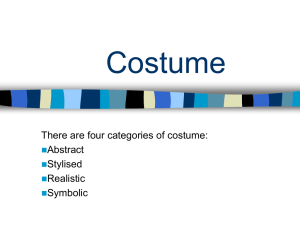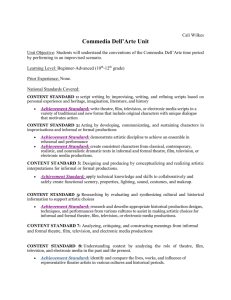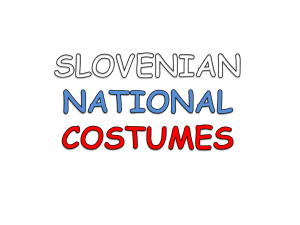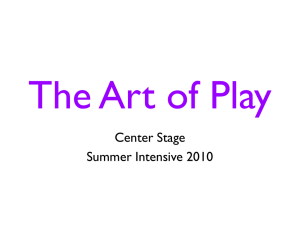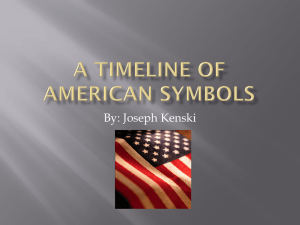Commedia Dell`Arte- Ava
advertisement
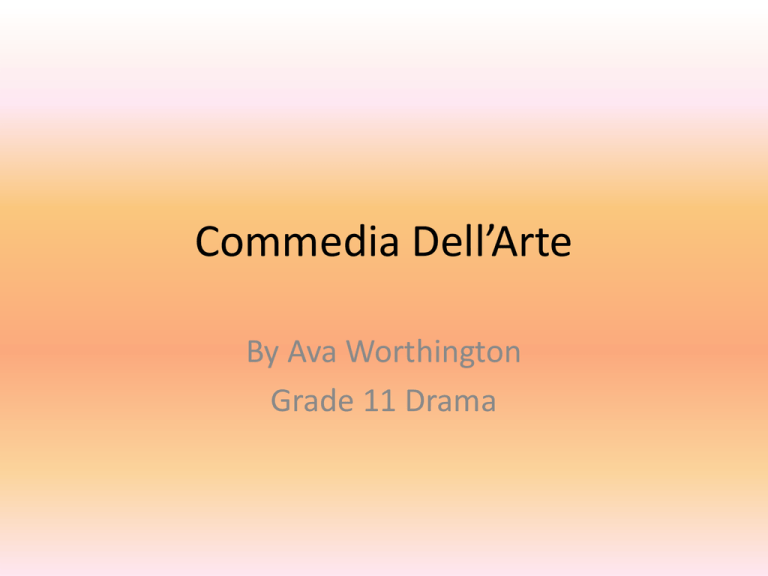
Commedia Dell’Arte By Ava Worthington Grade 11 Drama Introduction This is an ancient form of Italian theatre beginning in the 16th century. It is characterized and world renown for it’s use of masks and recognizable characters. It is now commonly referred to as the Origin of Comedy and believed to have emerged as a response to the political and economic oppression and chaos that reigned in Italy during the 16th century. Gallery of Characters The analysis of Commedia Dell’Arte characters is a long and complicated journey to fully understanding the transformation that this form of theatre has undergone through the centuries. However it can be concluded that Commedia Dell’Arte characters are the metamorphosing of the Zanni Characters and other influences such as Latin Commedy until they became the defined characters at the end of the 16th century. Zanni The word Zanni refers to a collection of characters, all of which are recognizable as: comical servant characters. The definition of Zanni is a series of stereotypical servant character. Characteristics that Zanni characters possess: • Old • Poor • Clearly a hired servant of another character. • His primary concerns are those of his comfort and immediate demands. • Clothes are white smocks and loose pants. • His concerns do not usually coincide to those of his master. These characteristics are often incorporated in characters and can be recognized as Zanni characteristics. This is a annotated timeline created in 1971 by the New Company Theatre in attempt to reconstruct and understand the influences and changes Comedia dell’arte has undergone. Stock Character Gallery Harlequin or Arlechinno His names is closely linked to Hellechinno which is translated to mean ‘Little Devil’. He is probably the most recognizable Zanni character, usually servant to Pantalone. Arlechinno seems to have been emerged a cross from a stereotypical Zanni character and much influenced by French traditional wild rugged man by Rudlin. Another primary aspect of Harlequin is his physical agility, he will always add simple acrobatics to a mundane task he is set such cartwheels, flips… in order to make the task more interesting. Costume Harlequin has a very defined flamboyant costume (it may vary in accordance to the different theatres) it constitutes of small black shoes, tight fitting jacket which is laced and buttoned down the front and matching tight pants. This outfit is sewn all over with triangular patches of bright colors (red, yellow, blue, green). There is also a black belt worn low on the hips. He wears a dark mask and hair is short shaved. Il’Capitano This character is essentially a loner who pretends to be extremely strong, courageous and high in status. It is ironic therefore that this is one of the weaker characters, he is the first to run from the battle, often very comical. He is very often large in presence and believes that the audience is there for him. He is not very cunning and therefore often manipulated by the other characters such as Pantalone who he believes to be in partnership with, he is also very greedy. Costume Follows a military influence, he wears colorful uniforms which is most often green and blue with large yellow triangles or patterns running down. Usually a cape or large coat. Large boots (not always matching). He always carries a sword which is ironically never used. His mask is a large nosed crocodile mask usually flesh colored. Colombina This character is the female Zanni known as Zagne. Her role was first called Sobretta or Servetta in translation a female servant. She is quite an attractive women and strong in personality. Most often always has an apron and carries a basket. Her poses are all inspired by ballet positions and her movements must be graceful as such. She is a responsible, good servant and always happy and becomes efficient when a task is given to her. She is in love with Harlequin but she sees through him. Costume Her costume is a dress showing a lot of cleavage and connected in colors and pattern (diamonds) to that of Harlequin whom she loves. In the scene where she is independent and not in love with Harlequin then she can be found in white and black influenced by the French maid outfit. She either wears a small mask that only covers her eyes or else no mask and heavily made up eyes. Pantalone He is very high in social status and controls the world of finance in Commedia Dell’Arte, therefore his orders are always obeyed. His physical appearance is old, tall and thin. Pantalone is the voice of the rude masculine consciousness and is only concerned in affairs when there is something in it for him. He always carries with him a handkerchief and money pouch at his waist. His position and stance is always bent over with age. Costume Always in dark colors of red and black and his name suggests he wears pantaloons (red) and yellow slippers. Loose, long black cloak. Wears a dark brown or black mask with a long hooked nose and very bushy eyebrows and white bears. The Innamorati-The Lovers The characters Isabella, Lelio, Flavio and Vittoria are all part of the Innamorati. These characters are all helplessly infatuated with one another so although they used to be high in social status they all descend due to their pursuit of their lover. They must all be young, attractive and gallant to their lovers. Ironically they are seen as quite ridiculous through the eyes of the other characters due to their infatuation. Costumes This is where the latest fashion in the period of time is expressed. Males can be seen wearing military and cadet uniforms. Women are seen wearing beautiful silk gowns often Renaissance influenced with necklaces of gold and pearls. The characters show off their sense of youth and fashion by changing several times throughout the play displaying a variety of outfits. Dottore Dottore is often a father of one of the lovers. He controls what surrounds medicine in Commedia Dell’Arte, however ironically and comically the Doctor has never cured a disease or illness throughout any of the plays. H is known for boasting of his travels, always carries a book and a handkerchief. He demands a large amount of space, as he is quite fat and has large arm movements. He is quite a greedy man and the other characters are bored by him. Costume Always in black, long jacket reaching his feet, slippers, large puffy sleeves, belt worn low under his protruding belly and stockings, and small cap. The only color is his white ruffled collar and handkerchief. His mask covers his eyes and nose revealing his reddened cheeks (expressing his softness for his liquor). Sources: • • • • • • • Accessed Tuesday 2 November 2010. Goldoni, C. (n.d.). La commedia dell'arte (xviie au xviiie siècle). Retrieved from http://www.webscolaire.jeaneudes.qc.ca/profs/bfriset/theatre/la%20commedia% 20dell Accessed Tuesday 2 November 2010. Zanni. (Published: 2010, August 24). Retrieved from http://en.wikipedia.org/wiki/Zanni Accessed Tuesday 2 November 2010. Character analysis. (n.d.). Retrieved from http://www.shane-arts.com/Commedia-Arlechinno.htm Accessed Tuesday 2 November 2010. Rudlin, J. (n.d.). Character analysis. Retrieved from http://www.shane-arts.com/Commedia-Capitano.htm Accessed Tuesday 2 November 2010. Rolfe, B. (n.d.). Character analysis. Retrieved from http://www.shane-arts.com/Commedia-Columbina.htm Accessed Tuesday 2 November 2010. Ducharte, P.L. (n.d.). Character analysis. Retrieved from http://www.shane-arts.com/Commedia-Pantalone.htm Mario and Flavia picture retrieved from http://digital.library.mcgill.ca/featherbook/images/tavola105.jpg
